The library collects books to support your studies. More recently we are purchasing mainly eBooks. This page presents three main categories of books: New Books, Prescribed Textbooks and Reference Books.
You can find books in the library by using uKwazi. The video below will guide you on how to search for books and articles on uKwazi.
Ebooks can be accessed by clicking on the relevant link on uKwazi. Physical books are shelved according to the Dewey Decimal Classification (DDC) System and School of Government / Public Adminsitration books are mainly located on level 7 of the main library at the below subject categories and DDC numbers. Prescribed textbooks are kept at the short loans circulation desk on level 5.
| SUBJECT CATEGORY |
DDC NO. |
| Public administration | 350 |
| Public administration of central government | 351 |
| Public administration - Research | 351.072 |
| Public administration - South Africa | 351.0968 |
| Local government | 352 |
| Local government - South Africa | 352.068 |
| Politics and government - South Africa | 354.68 |
We have recently added a few new book titles to our collection. Make sure to check this page regularly to discover fresh and exciting titles that have been added. Stay updated with the latest additions to our collection!
 A guide to project management
by
Gerrit van der Waldt & William Fox., Lansdowne
The updated third edition of A Guide to Project Management has been extensively updated to reflect changes in the processes and procedures of project management, global trends and international standards, and the expansion of the Project Management Body of Knowledge. It also includes a new chapter on Project Management and Development Studies. There are extensive self-assessment questions, group activities, exercises, and guidelines for the completion of a summative assignment/portfolio of evidence based on SAQA Unit Standards and chapter outcomes.
A guide to project management
by
Gerrit van der Waldt & William Fox., Lansdowne
The updated third edition of A Guide to Project Management has been extensively updated to reflect changes in the processes and procedures of project management, global trends and international standards, and the expansion of the Project Management Body of Knowledge. It also includes a new chapter on Project Management and Development Studies. There are extensive self-assessment questions, group activities, exercises, and guidelines for the completion of a summative assignment/portfolio of evidence based on SAQA Unit Standards and chapter outcomes.
 Improving public policy for sustainable development impact in the digital era
by
Fanie Cloete et. al.
It summarises the latest international knowledge and experience in these diverse fields to deal with the complexities of societal transformation through optimal public policy interventions in an increasingly digital era and under increasing resource constraints. In this process, the book links the theory and practice of public policy in a user-friendly and practical way. It explains what public policy is and should be, why and how it is created, and how public policy content, processes, outputs and outcomes can be improved to promote optimal good governance and achieve sustainable developmental goals in the information society of the 21st century, especially in complex developing countries.
Improving public policy for sustainable development impact in the digital era
by
Fanie Cloete et. al.
It summarises the latest international knowledge and experience in these diverse fields to deal with the complexities of societal transformation through optimal public policy interventions in an increasingly digital era and under increasing resource constraints. In this process, the book links the theory and practice of public policy in a user-friendly and practical way. It explains what public policy is and should be, why and how it is created, and how public policy content, processes, outputs and outcomes can be improved to promote optimal good governance and achieve sustainable developmental goals in the information society of the 21st century, especially in complex developing countries.
 Intergovernmental relations in South Africa
by
Sinval Kahn, Steve Mpedi Madue, Rashid Kalema.
The term "intergovernmental relations" refers to the way in which the different spheres of a government hierarchy relate to each other. This concept is of vital importance where there is a division of power at both administrative and legal levels among different spheres of government. Intergovernmental relations in South Africa examines the South African government's quest to enhance effective and efficient service delivery to the people. Case studies are included in all chapters to provide a hands-on approach to relate theory to practice. This book discusses four distinct approaches to the subject: the constitutional/legal approach, the democratic approach, the financial approach and the normative/operational approach. It culminates in a delineation of practical steps for the promotion of well grounded intergovernmental relations, sustainable capacity building and trustworthy political accountability. The book also focuses on intergovernmental relations network and cooperative governance in South Africa as well as governmental relations in the BRICS countries. Intergovernmental relations in South Africa is suitable not only for academics but also for practitioners in the fields of public administration and management, political sciences, social sciences, law and other related disciplines.
Intergovernmental relations in South Africa
by
Sinval Kahn, Steve Mpedi Madue, Rashid Kalema.
The term "intergovernmental relations" refers to the way in which the different spheres of a government hierarchy relate to each other. This concept is of vital importance where there is a division of power at both administrative and legal levels among different spheres of government. Intergovernmental relations in South Africa examines the South African government's quest to enhance effective and efficient service delivery to the people. Case studies are included in all chapters to provide a hands-on approach to relate theory to practice. This book discusses four distinct approaches to the subject: the constitutional/legal approach, the democratic approach, the financial approach and the normative/operational approach. It culminates in a delineation of practical steps for the promotion of well grounded intergovernmental relations, sustainable capacity building and trustworthy political accountability. The book also focuses on intergovernmental relations network and cooperative governance in South Africa as well as governmental relations in the BRICS countries. Intergovernmental relations in South Africa is suitable not only for academics but also for practitioners in the fields of public administration and management, political sciences, social sciences, law and other related disciplines.
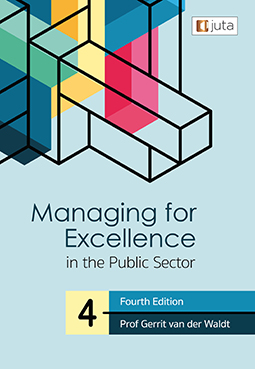 Managing for excellence in the public sector
by
Gerrit van der Waldt.
The South African Government requires a more holistic and integrated approach to management to address the pressing shortage of competent and capable public managers. By pursuing an objective- or criterion-oriented approach designed for mastery learning, this fourth edition makes provision for the latest governance trends and managerial developments by incorporating these in the scholarly frame of Public Management and Administration. As such, both a theoretical (i.e. academic) and practical basis are pursued for building the knowledge and competencies of current and prospective public managers. Especially the practical examples as well as self-evaluation exercises and questions make a significant contribution in this regard. Examples used are also updated to be more relevant to the current trends and developments in the public sector. Emphasis is placed on the managerial dimensions associated with these paradigms and as such the scope is rather limited and narrow. In other words, the focus falls on the knowledge, skills, competencies and capacities of an individual public sector manager and not necessarily on a broader analysis of governance. In this sense, this publication does not conform to the more traditional or conventional content associated with general Public Administration and Management or Public Governance study texts.Learners should have easy access to such sources. The lists of supplementary literature at the end of each chapter were compiled with these purposes in mind.
Managing for excellence in the public sector
by
Gerrit van der Waldt.
The South African Government requires a more holistic and integrated approach to management to address the pressing shortage of competent and capable public managers. By pursuing an objective- or criterion-oriented approach designed for mastery learning, this fourth edition makes provision for the latest governance trends and managerial developments by incorporating these in the scholarly frame of Public Management and Administration. As such, both a theoretical (i.e. academic) and practical basis are pursued for building the knowledge and competencies of current and prospective public managers. Especially the practical examples as well as self-evaluation exercises and questions make a significant contribution in this regard. Examples used are also updated to be more relevant to the current trends and developments in the public sector. Emphasis is placed on the managerial dimensions associated with these paradigms and as such the scope is rather limited and narrow. In other words, the focus falls on the knowledge, skills, competencies and capacities of an individual public sector manager and not necessarily on a broader analysis of governance. In this sense, this publication does not conform to the more traditional or conventional content associated with general Public Administration and Management or Public Governance study texts.Learners should have easy access to such sources. The lists of supplementary literature at the end of each chapter were compiled with these purposes in mind.
 Monitoring and evaluation of policies, programmes and projects
by
I. Ile, C. Eresia-Eke, C. Allen-Ile.
The need for results delivery in private- and public-sector organisations has increased and along with it the pressure on organisations to demonstrate their performance. As operational resources remain limited, organisations are effectively being expected to deliver more results with less input, and it has become even more essential to consider from the outset how the success, failure or progress of any endeavour will be periodically examined. Monitoring and evaluation of policies, programmes and projects examines the key concepts and practices involved in performance tracking and evaluation.Monitoring and evaluation of policies, programmes and projects carefully balances theory and practice to make the content easy to understand and apply in the workplace. This edition also begins unpacking the issue of decolonialisation and the emerging area of indigenous monitoring and evaluation (IM&E).
Monitoring and evaluation of policies, programmes and projects
by
I. Ile, C. Eresia-Eke, C. Allen-Ile.
The need for results delivery in private- and public-sector organisations has increased and along with it the pressure on organisations to demonstrate their performance. As operational resources remain limited, organisations are effectively being expected to deliver more results with less input, and it has become even more essential to consider from the outset how the success, failure or progress of any endeavour will be periodically examined. Monitoring and evaluation of policies, programmes and projects examines the key concepts and practices involved in performance tracking and evaluation.Monitoring and evaluation of policies, programmes and projects carefully balances theory and practice to make the content easy to understand and apply in the workplace. This edition also begins unpacking the issue of decolonialisation and the emerging area of indigenous monitoring and evaluation (IM&E).
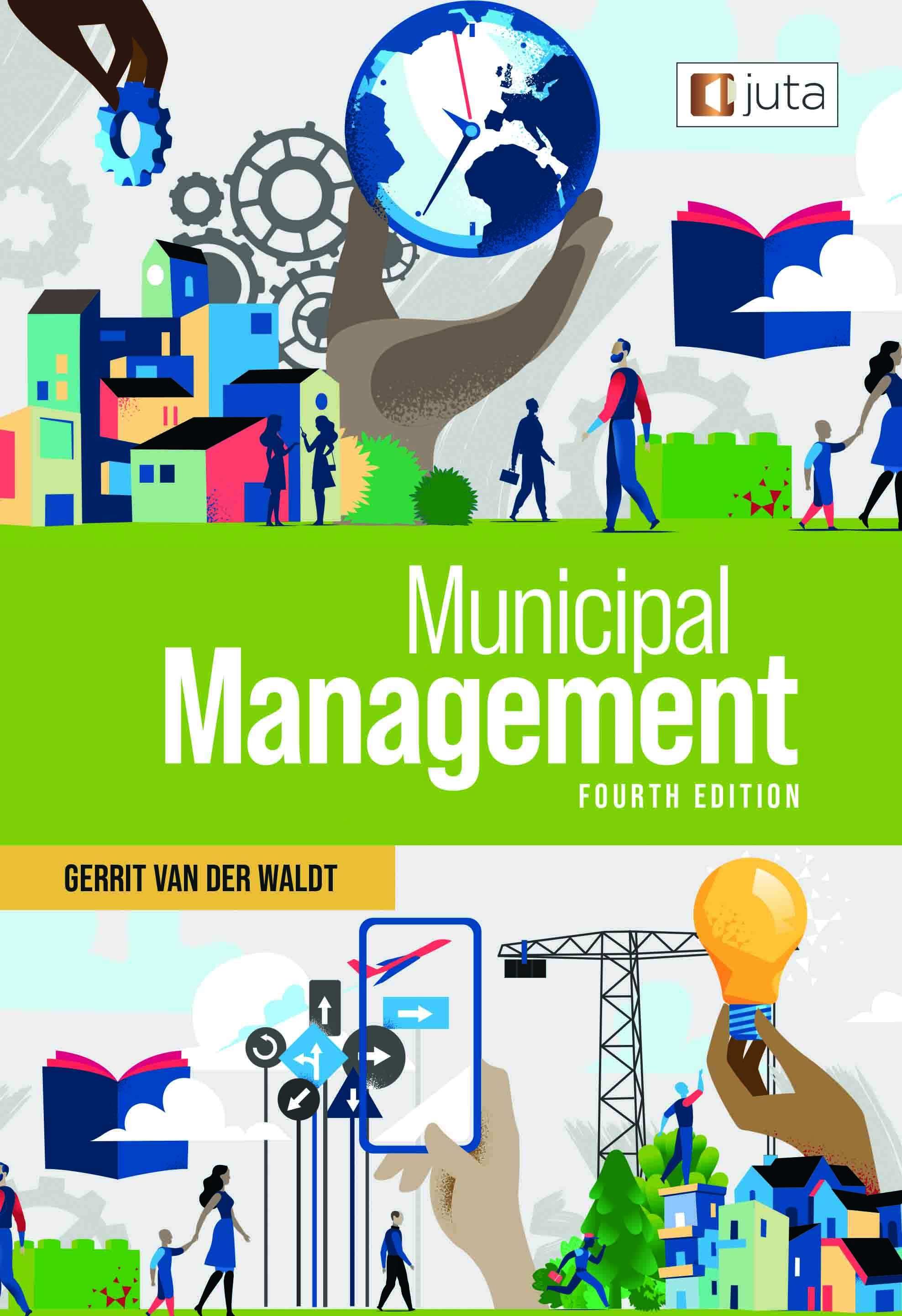 Municipal management : serving the people
by
Gerrit van der Waldt (editor).
What are the dynamics around the quality and quantity of municipal services in South Africa? What kind of systemic, structural and managerial adjustments should be made to improve local government? Who decides what in municipalities? How could active citizen participation in local affairs be stimulated? These and other questions are addressed in Municipal Management: Serving the people. The authors take a bird’s-eye view of issues such as the constitutional dispensation, regulatory frameworks, municipal administrative and managerial systems, community and political dynamics, as well as municipal functions and services. This third edition reflects new features of, and the latest developments in, the local sphere of government, which makes the book even more relevant to – • Contextualise the local sphere of government within a system of co-operative governance and intergovernmental relations• Appreciate the role and functioning of local, district and metropolitan municipalities in South Africa• Uncover core municipal policies, strategies and programmes• Comprehend the significance of municipal capacity for effective resource utilisation and service delivery• Pinpoint best practice regarding managerial systems, processes and procedures.
Municipal management : serving the people
by
Gerrit van der Waldt (editor).
What are the dynamics around the quality and quantity of municipal services in South Africa? What kind of systemic, structural and managerial adjustments should be made to improve local government? Who decides what in municipalities? How could active citizen participation in local affairs be stimulated? These and other questions are addressed in Municipal Management: Serving the people. The authors take a bird’s-eye view of issues such as the constitutional dispensation, regulatory frameworks, municipal administrative and managerial systems, community and political dynamics, as well as municipal functions and services. This third edition reflects new features of, and the latest developments in, the local sphere of government, which makes the book even more relevant to – • Contextualise the local sphere of government within a system of co-operative governance and intergovernmental relations• Appreciate the role and functioning of local, district and metropolitan municipalities in South Africa• Uncover core municipal policies, strategies and programmes• Comprehend the significance of municipal capacity for effective resource utilisation and service delivery• Pinpoint best practice regarding managerial systems, processes and procedures.
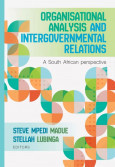 Organisational analysis and intergovernmental relations : a South African perspective
by
Steve Mpedi Madue, Stellah Lubinga.
Organisational analysis and intergovernmental relations: a South African perspective discusses how organisations work, how to conduct organisational analysis and how organisations can benefit from the advantages of intergovernmental relations in order to maximise productivity, effectiveness and profitability. Organisational analysis and intergovernmental relations: a South African perspective provides an overview of organisations, and the organisational design and structures applicable to both the private and public sectors.
Organisational analysis and intergovernmental relations : a South African perspective
by
Steve Mpedi Madue, Stellah Lubinga.
Organisational analysis and intergovernmental relations: a South African perspective discusses how organisations work, how to conduct organisational analysis and how organisations can benefit from the advantages of intergovernmental relations in order to maximise productivity, effectiveness and profitability. Organisational analysis and intergovernmental relations: a South African perspective provides an overview of organisations, and the organisational design and structures applicable to both the private and public sectors.
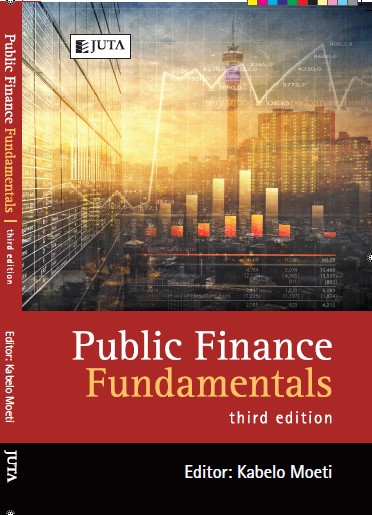 Public finance fundamentals
by
Kabelo Moeti (editor).
Public Finance Fundamentals, now in its third edition, aims to facilitate and advance the learning of the fundamentals of public finance, the basic tenets that apply even as the social, political and legislative environments of organisations shift over time. The idea of the book is to equip readers with long-lasting knowledge, skills, and analytical tools to successfully tackle various types of organisational, institutional and public sector dynamics, by giving them an understanding of financial management concepts, principles, theory, and policy.
This third edition of Public Finance Fundamentals expands the scope of the previous editions to cover contemporary concerns and debates emanating from emerging economic and financial trends in many developing countries, including South Africa.
Public finance fundamentals
by
Kabelo Moeti (editor).
Public Finance Fundamentals, now in its third edition, aims to facilitate and advance the learning of the fundamentals of public finance, the basic tenets that apply even as the social, political and legislative environments of organisations shift over time. The idea of the book is to equip readers with long-lasting knowledge, skills, and analytical tools to successfully tackle various types of organisational, institutional and public sector dynamics, by giving them an understanding of financial management concepts, principles, theory, and policy.
This third edition of Public Finance Fundamentals expands the scope of the previous editions to cover contemporary concerns and debates emanating from emerging economic and financial trends in many developing countries, including South Africa.
 Public procurement and supply chain management
by
I.M. Ambe, J.A. Badenhorst-Weiss, editors.
An in-depth look at procurement and supply chain management in the public sector, with special reference to applicability in South Africa. Provides new ideas, concepts, case studies and practical experiences. Aimed at students, government officials, academics, researchers, consultants and other concerned parties.
Public procurement and supply chain management
by
I.M. Ambe, J.A. Badenhorst-Weiss, editors.
An in-depth look at procurement and supply chain management in the public sector, with special reference to applicability in South Africa. Provides new ideas, concepts, case studies and practical experiences. Aimed at students, government officials, academics, researchers, consultants and other concerned parties.
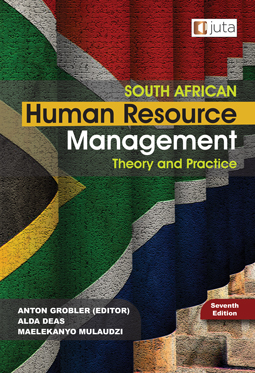 South African human resource management : theory and practice
by
Anton Grobler, Maelekanyo Mulaudzi and Alda Deas
South African human resource management, now in its seven edition, answers the growing demand for human resource management (HRM) compendium specific to South Africa.
"The seventh edition of South African Human Resource Management: Theory and Practice has been thoroughly revised and updated. Our broader African context is accentuated even further, making it very clear that we need to find, craft, and execute HRM strategies that suit our unique circumstances in South Africa and Africa more broadly. Africa is at an exciting yet critical juncture. This continent boasts almost a third of the world’s mineral wealth and two-thirds of its remaining arable land, and it is estimated that by the end of the current century about half of all young people on the planet will be in Africa. Our continent’s future success is therefore locked up in this yet-to-be-realised human resource dividend, and South African managers in our local organisations as well as elsewhere in Africa and the world must lead the charge in unlocking and fully developing it.
South African human resource management : theory and practice
by
Anton Grobler, Maelekanyo Mulaudzi and Alda Deas
South African human resource management, now in its seven edition, answers the growing demand for human resource management (HRM) compendium specific to South Africa.
"The seventh edition of South African Human Resource Management: Theory and Practice has been thoroughly revised and updated. Our broader African context is accentuated even further, making it very clear that we need to find, craft, and execute HRM strategies that suit our unique circumstances in South Africa and Africa more broadly. Africa is at an exciting yet critical juncture. This continent boasts almost a third of the world’s mineral wealth and two-thirds of its remaining arable land, and it is estimated that by the end of the current century about half of all young people on the planet will be in Africa. Our continent’s future success is therefore locked up in this yet-to-be-realised human resource dividend, and South African managers in our local organisations as well as elsewhere in Africa and the world must lead the charge in unlocking and fully developing it.
The following are prescribed textbooks for your subject. However, please note that it is essential to refer to your course outline or consult with your lecturer to ensure accuracy regarding the exact prescribed texts for your specific course or level of study.
To be added in due course!
We have curated a selection of key reference books in our collection for this subject.
Reference books, also known as reference materials or resources, are specialized publications that provide concise and reliable information on specific subjects. They are designed to be consulted for quick reference, providing factual details, definitions, explanations, and summaries. Reference books often cover a wide range of topics and are typically organized in alphabetical order or by subject for easy access. Examples of reference books include dictionaries, encyclopedias, atlases, almanacs, handbooks, and directories.
 Public Administration Research Guide
by
Virginia R. Cherry; Marc Holzer
Public Administration Research Guide
by
Virginia R. Cherry; Marc Holzer

University of the Western Cape,
Robert Sobukwe Road,
Bellville,
7535
Tel: 021 959 2946
